Florian, Adrien, and I would embark on an extraordinary journey this morning! To the centre of the Earth (enter Jules Verne)? Or perhaps to another planet? Whilst it feels like either is possible here, we climbed aboard a 4WD and journeyed down into the inhospitable Danakil Depression. One of the lowest and hottest points on Earth, and named by National Geographic as "the cruelest place on Earth," many people have perished here and a group of tourists was kidnapped several years ago, but this brutal region has been traversed for centuries by the Afar peoples with their camel caravans and slabs of salt. The region is also home to a quarter of Africa's volcanoes. As we made our way out of the mile-high city of Mekele we slowly made our way down a gravel road. The view didn't really change much except that we were leaving the city behind for a couple of days. An hour or so into our drive we came upon a tractor which became stuck and has been abandoned. I've sure seen plenty of these in Ethiopia, and in fact I've never been to a country in which I've observed so much construction and road work taking place. We continued to drive lower into the Depression and I could feel my breath returning to a sea-level state. When we stopped in Berahile for lunch it definitely had a different air and a more pronounced Muslim influence. Flies buzzed everywhere as I chowed down on a salad and sipped some tea. We drove slowly further, and further into an extraordinary landscape we journeyed. This area really felt like another planet! I can't say Mars, or Venus, or Mercury, but rather some far away unknown world several light years away that we've just landed on. It feels like it's just a few of us and we have the entire planet to ourselves! What should we name our planet? I was thinking of that until we came across a camel caravan at least 80 camels long. The Afar people travel to the Danakil to collect bars of salt to sell in Mekele and sometimes even Addis. The long journey takes at least a week one way, and even though there are modern methods such as trucks available these courageous people make the journey as they have for many centuries. It makes me wonder where they get their food and water; there is very little plant life and there are no freshwater rivers or lakes out here. Earlier today we were at more than a mile high but several hours later we'd be below sea level. We'd be sleeping under the stars tonight as we pulled into Hamd Ela. As I gazed across the plain and at the nearby mountains I had a hard time imagining that normally I'd be nearly 100 metres beneath the sea. It's as dry as a bone here and the homes and buildings are constructed with sticks.
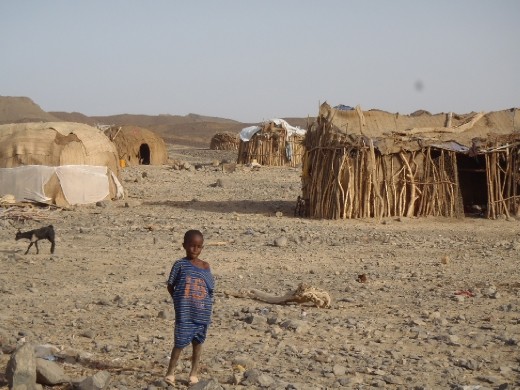
As we set up our mattresses and started to prepare dinner, a huge sandstorm formed and it sent all of us running for either vehicles or the cooking hut. Wind blew through the hut strong enough that the cook had to put the gas cooker inside the cooler to prevent the flame from being blown out. Sitting in the 4WD wasn't an option because it'd get far too hot too quickly. Still though I wasn't fazed because I wanted to sleep under the stars; I could lay with my head with the direction of the wind, and the wind has the added advantage of keeping the bugs at bay. A tasty soup and spaghetti were our dinner tonight, and I must be thankful. It's a real novelty to have hot food in a place this remote. This trip cost each of us $210 and it's the one thing I've really splurged on in Ethiopia, but I can tell it's totally work it! The reason the cost is high is because the only practical means of getting here (aside from a camel caravan) is via 4WD, and due to a kidnapping of tourists several years ago, an armed escort is required. After a good dinner and a cup of tea I rested my head as the wind blew strong.
The next morning would be even more extraordinary as we ventured further into the Danakil. The wind allowed me to sleep soundly as I got a glorious view of the rising sun. I opted to ride in the bed of the ute and whilst driving across a flat, brown plain we came across an Afar nomad with his camel caravan. Momentarily I got to be an Afar and spearhead a caravan.
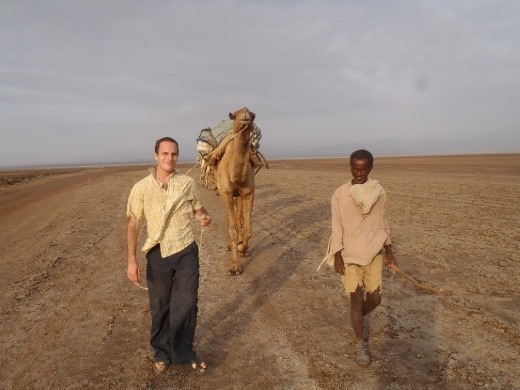
When we parked a short drive away it really felt like another planet. As we walked up a hill our two vehicles were LEGO size and there was absolutely no other evidence of human habitation. The landscape suddenly became extremely surreal with a multitude of colours and I could sense the scent of sulphur reminiscent of Iceland or Rotorua.
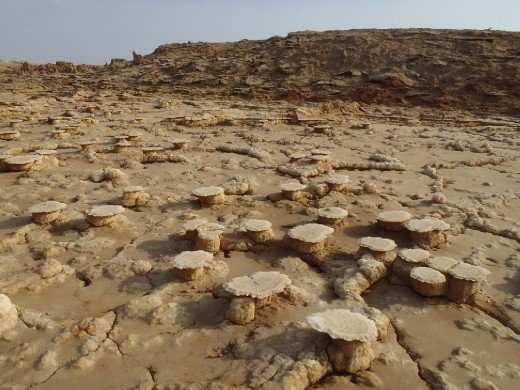
Adrien noted "this is the only place in Ethiopia where you can smell bacon." I reckon the reddish brown rocks look like Chinese orange chicken but I wouldn't attempt to eat anything here. Boiling water seeped up from the vents as I strolled on the hot ground.
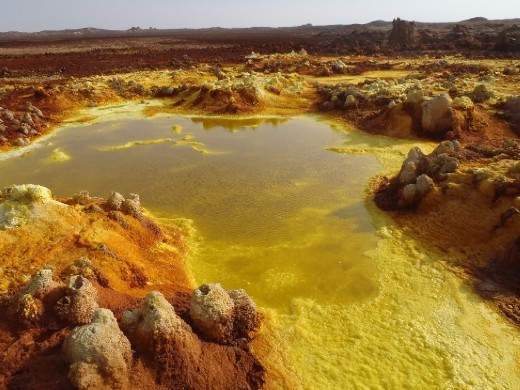
Our escort told us to stay on the dark-coloured areas because that's where the ground is thickest. Ethiopia is such an extraordinary place! In a stretch of only a few weeks I've encountered towering mountains and volcanic depressions, and gone from being at Chenek, roughly 4,000 metres high to here, about -100 metres. After visiting an abandoned Italian mining settlement we made our way to another amazing geological sight! These are like mountains and it's as though we humans are super-sized.
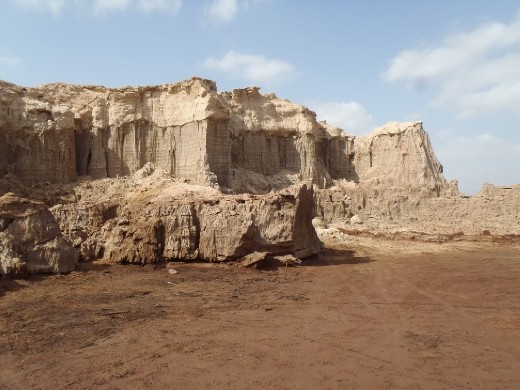
Bravely climbing up on of these, Adrien got a photo of me. Mud stuck to the bottom of my shoes (I don't know where the water came from) as we strolled like giants out of our "mountains" and onto a boiling lake. Yellow water boils up from deep below, although the surface is brown.
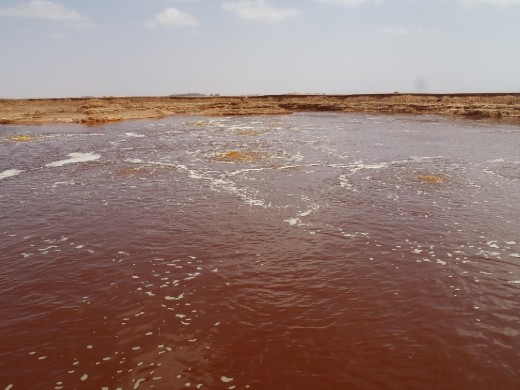
I wouldn't want to jump in here! The Danakil is an extraordinary place, and if I had more time and money I would have arranged a 4-day trip to visit Erta Ale volcano: said to be an impressive sight at nightfall. As though we haven't seen enough extraordinary sights, we visit another that's completely different to all the others: a salt plain. Looking very similar to Salar de Uyuni (Bolivia) we drove onto the lakebed where I got one of the best photos I've ever snapped in all my travels!
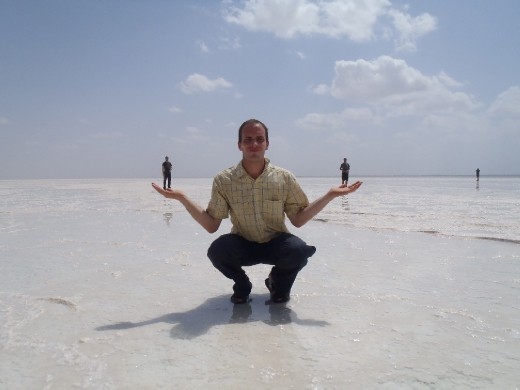
These kind of photos are often taken at Uyuni, so when everyone sees it they'll think it's there. But no, it's in Ethiopia! After our salt plain jaunt, it was our turn to be an Afar nomad (for a few minutes) and help lift the slabs of salt. Each slab weights approximately 6 kg and it's value rises the further it travels from the Danakil.
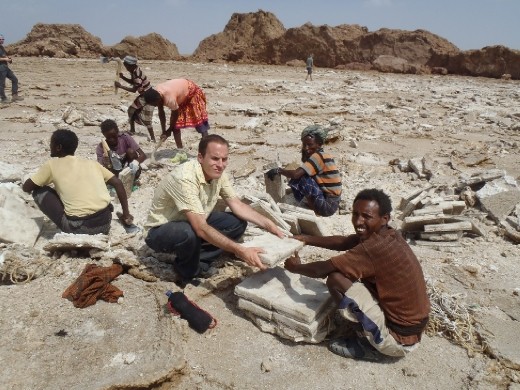
This area is seriously in the middle of nowhere: no houses, no water, scarce food, and no guarantees. It really makes me wonder how these people have been doing this all these centuries, far longer than the life of the computer, the telephone, the TV. and the automobile. After our excursion to "the centre of the Earth" it was time for a nice lunch before we made the long, slow drive back to Mekele. It was only a 2-day trip but allowed for countless extraordinary landscapes and a lifetime of memories